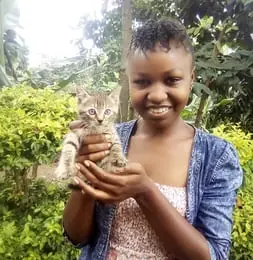
A kitten will jump from high places if it:
- Sees a bird or insect and wants to follow it.
- Wants to eat food on the kitchen counter.
- Is being chased by a dog.
Your kitten can get hurt if it jumps from a high place and fall. Remove food crumbs from kitchen counters and provide your kitten with an indoor cat tree to discourage jumping.
There are lots of activities kittens engage in, especially when they are in a happy mood. One of these is jumping. Although we often see adult cats jumping from reasonably high heights, it won’t be that simple for a kitten.
Your kitten’s body is still fragile and it might be hard for your little one to perform such stunts. Yet, as we know, when it comes to felines anything is possible, and that is why I want to explain all about your cat’s jumping behavior.
The last thing you want is for your kitten to fall and hurt itself in the process. This article will show how kittens can jump from high places. You will also learn how to know to protect your kitten from falling.
Keep reading to also know why your kitten and cats in general, like to sit in high places.
Kittens can jump out of open windows
Often as people open their window to enjoy the warm sun they don’t realize they are putting their kitten at risk.
If you leave the window open and your apartment is above the ground floor, your kitty could jump out of the window and get hurt.
Kittens rarely jump from high places because they are often scared of heights. However, we cannot completely rule out the possibility of your kitten jumping. It can be chased by a dog, and the only way to escape is to jump.
Your kitten may also get startled by a loud noise in your home, such as caused by you dropping something. We’ve all seen the videos on Youtube of how a kitten can jump just from seeing a cucumber.
Your kitten can also be distracted by a bird or an insect, then in the process of pursuing the prey, it jumps from a high place.
They can jump off kitchen counters
Food leftovers and crumbs can attract your kitten to kitchen counters, and then jumping off is their only route to get back down.
Some might assume that since cats land on their feet, they can walk away unharmed after a fall. Yet this isn’t always true. Your kitten can get seriously injured from falls resulting in:
- Broken teeth.
- Shattered jaws.
- Broken limbs.
Even short distances are equally dangerous. Your feline friend needs time to twist itself to land on its feet, and a short fall may not give them enough time to do this.
That’s why your kitten can fall from your bed to the floor and get injured. But the good thing is that felines have great survival instincts, and will rarely jump from a high place unless they are sure of a safe landing.
How to Stop Your Kitten from Jumping
Jumping is a natural behavior in kittens. Kittens jump as part of their playful nature or to practice their hunting skills.
As a cat owner though, you can find yourself in rescue missions when your kitten gets stranded on top of trees.
Here is how to keep your kitten off unwanted high surfaces:
1. Provide it with an indoor cat tree
An alternative vertical space in the house provides your kitten with a safe outlet for climbing without the risk of falling and injuring itself. Cat trees are designed with carpeting, sleeping platforms, and different levels of jumping and climbing down.
You can design the cat tree to match your kitten’s body; you don’t want to give a 2-month-old kitten a very tall cat tree.
2. A kitty condo does the trick

Another alternative vertical space you can give your feline friend is a kitten condo. It is much like a cat tree, but it has more elaborate designs, including an enclosed room for your kitten to sleep, scratching posts, and toys.
The base of the condo is sturdy and wide to prevent your kitten from getting hurt when it climbs it. This is a good place for your kitty to perch and sleep.
3. Feed your kitten on the floor
A kitten jumps onto high kitchen counters or tables as it is looking for food. If it has stolen food from these places once or twice, it could be associating high surfaces with food.
Feed your kitten multiple small meals throughout the day, and ensure you do this on the floor and never on countertops.
Ensure your kitchen tops are clear of human food and crumbs so that your pet won’t be tempted to jump and steal.
High Syndrome in Cats
High syndrome in felines refers to injuries your kitty sustains when they fall from a steep height.
Cases of this syndrome tend to rise during summer when windows are always open. As your kitten basks in the warm sun, it can easily fall out of an open window.
Loud noises such as that of a vacuum can also startle your kitten and make it fall out of a window.
Balconies and terraces are inviting places for your kitten to enjoy the breeze. However, these areas also pose a risk for such kinds of accidents.
A gap in the ironwork can result in a missed step, and thus your kitten falls.
Sleep is another reason for kittens falling. Just like us, cats also dream. During their deep sleep, your furry friend can dream it’s running or hunting, and such a dream can cause it to move from where it’s sleeping and fall.
How to Prevent High Syndrome
Here are some tips to ensure this unfortunate incident does not happen:
- Don’t leave your kitten on the balcony or terrace unsupervised. Always keep a close eye on it.
- Keep all windows closed.
- Secure all window screens. Remember that your kitten can fit into small spaces and even a loose screen can cause your little’s one fall.
- Remove chairs or tables at the balcony or terrace railings because your kitten can use these to climb on to.
- Place a soft blanket or rug on floor areas where your kitten is likely to jump from. Falling on hard surfaces can cause injuries.
Watch out for Signs of Injury in your Kitten

Soft tissue injuries, sprains in the muscle, and bruises are common types of injuries in kittens because their growing bodies are vulnerable. Kittens are at a stage in life where they are exploring the world and testing their limits with their bodies.
If your house has many opportunities for your kitten to jump, there is even an increased risk of your little one falling because its body is not yet equipped to safely land on its feet.
Since your furry friend does not yet know its limits, it could jump from dangerous heights, resulting in accidents. If this happens when you are away, you might not realize it and your kitten could be injured.
That’s why it’s important to watch out for signs of injury in your kitten to know how to help it. Here are behaviors in your kitty that could show it is hurt:
- Limping, or reluctance to walk or stand
- Pain when it moves
- Stiff gait
- Not wanting to move around
- Excessive vocalization.
- Reduced appetite.
- Licking its limb excessively.
- Changes in breathing.
If you notice these signs, refrain from vigorous play with your kitten and take it to a veterinarian. The good thing is that these might be mild symptoms and will go away with time, but still take it to a medical professional if you have any doubts. Even if you think everything will be okay, ifthere is no improvement after two days, or the swelling continues, take it to your vet.
They may prescribe anti-inflammatory medication or bandage the injured paw. However, if you kitten seems completely fine, usually an injury is not so severe so as to require the assistance of a vet.
Just ensure your kitten gets enough rest. You can also place ice packs on the injured area to provide pain relief.
Why your Kitten Likes to sleep up High
Cats are known for being fussy and this attitude also extends to their sleeping habits. You provide a large crate for your kitten to relax inside only to find your kitty has chosen another area.
Your kitty prefers to lounge in high places with good vantage points. This comes from their instincts to protect themselves. An elevated position for sleeping gives your kitten an aerial view which helps it to spot any dangers.
Their ancestors in the wild relied on their jumping abilities which made it easy for them to retreat away from large predators. Sitting in high places also enabled them to attack smaller prey.
Therefore, this habit of climbing up high places and jumping is natural for felines, and this has been passed to the furry friends we have in our houses today.
